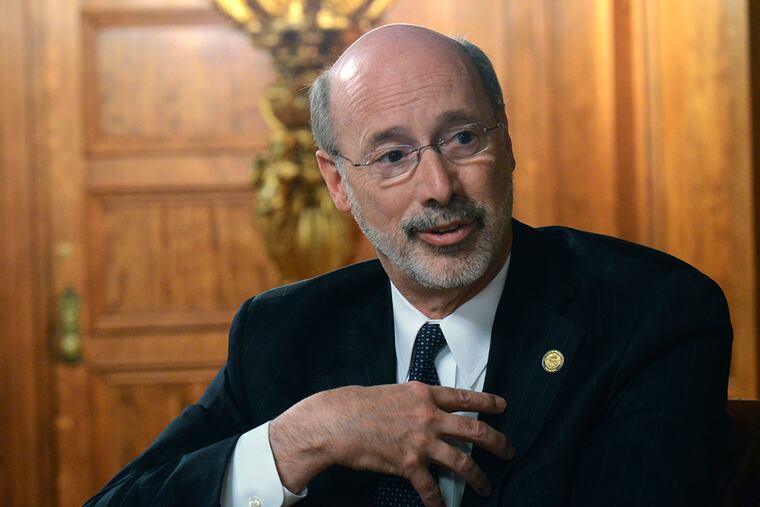PhillyDeals: Wolf's pension fix: What a bond can, and can't, do
Stop panicking about Pennsylvania pensions, says Randy Albright, Gov. Wolf's budget secretary. Yes, the state's history of overpromising and underfunding, so veteran public workers (and elected officials) can collect nearly their old take-home pay as retirees, has dug taxpayers into a hole.

Stop panicking about Pennsylvania pensions, says Randy Albright, Gov. Wolf's budget secretary.
Yes, the state's history of overpromising and underfunding, so veteran public workers (and elected officials) can collect nearly their old take-home pay as retirees, has dug taxpayers into a hole.
Sure, the state workers' (SERS) and school (PSERS) pensions have scraped together just around $75 billion of the $130 billion- plus they would need to invest to pay pensions for today's public employees and retirees until they're all dead.
To prevent the cash from running down - since worker contributions and the state's often-exotic investments bring in less than pensioners are paid each year - taxpayers have had to pay in more each year since the mid-2000s, squeezing out other state spending.
"A tapeworm" eating his budget, Gov. Tom Corbett called the pensions. Moody's last year cut Pennsylvania's bond rating to the third-lowest of the 50 states, citing its pension-finance failure. Only Illinois and New Jersey, with bigger pension problems, have worse credit.
Popular suggestions such as putting new employees on a do-it-yourself 401(k)-type plan don't magically reduce what the state already owes. So Wolf has a plan:
He wants to borrow $3 billion at today's low interest rates (Albright estimates 4.5 percent), invest it at the state's target return of 7.5 percent (PSERS made a little more, SERS made a little less, last year), and give the 3 percent difference to PSERS to boost investments.
How will the state pay for these bonds?
Wolf (like Corbett, in his State Store system-sale-and- revenue-boosting scheme) wants Pennsylvanians to drink more. Or, at least, buy more from the Pennsylvania Liquor Control Board, while also squeezing producers and wholesalers. If that's not enough, the state will find other cash. That's how bonds work.
Can a $3 billion bond really pay down a $50 billion-plus deficit?
Of course not, silly. Wolf won't make pension payments go away; he's trying to make them stop growing.
Under current state rules, Albright says profits from the $3 billion, doled out over time, will be enough so the surcharge taxpayers have to pay into PSERS each year - now 21 cents for every dollar of teacher pay - will stay about the same over the life of the bond, instead of escalating.
(Under the state's arcane rules, payments to SERS workers are projected to level out by 2016, Albright notes. (PSERS will keep rising.) State taxpayers now contribute 14 cents atop every dollar of pay, for most new hires under SERS, up to 29 cents for veteran legislators, 32 cents for state troopers.
Will Republicans agree?
Albright notes GOP members in the General Assembly last year proposed borrowing up to $9 billion to stabilize pensions.
Is this safe?
State and city pension bonds in the past have been "a major fiasco," says Olivia Mitchell, who heads Wharton's pension research center.
She sent me a study by Alice H. Munnell, Jean-Pierre Aubry, and Mark Cafarelli at Boston College last year, which found the typical pension bond yielded just 1.5 percent, half what Pennsylvania hopes for. And it's risky: Governments can lose money when they invest pension bond cash just as securities markets fall, as has happened to Philadelphia, Detroit, and Puerto Rico.
"I am not a big fan of pension bonds," Alan Schankel, managing director-fixed income at Janney Montgomery Scott in Philadelphia, told me. Bond debts, unlike pension obligations, force governments to pay even in bad years when they can barely fund basic services.
Or maybe that's the point: to keep Pennsylvania, like a deadbeat dad, on a long-term payment schedule.
After years of neglect, "this is all a problem of our own making," Albright told me.